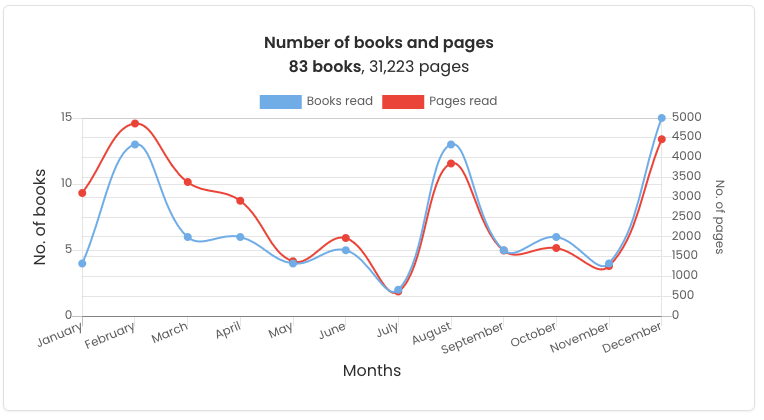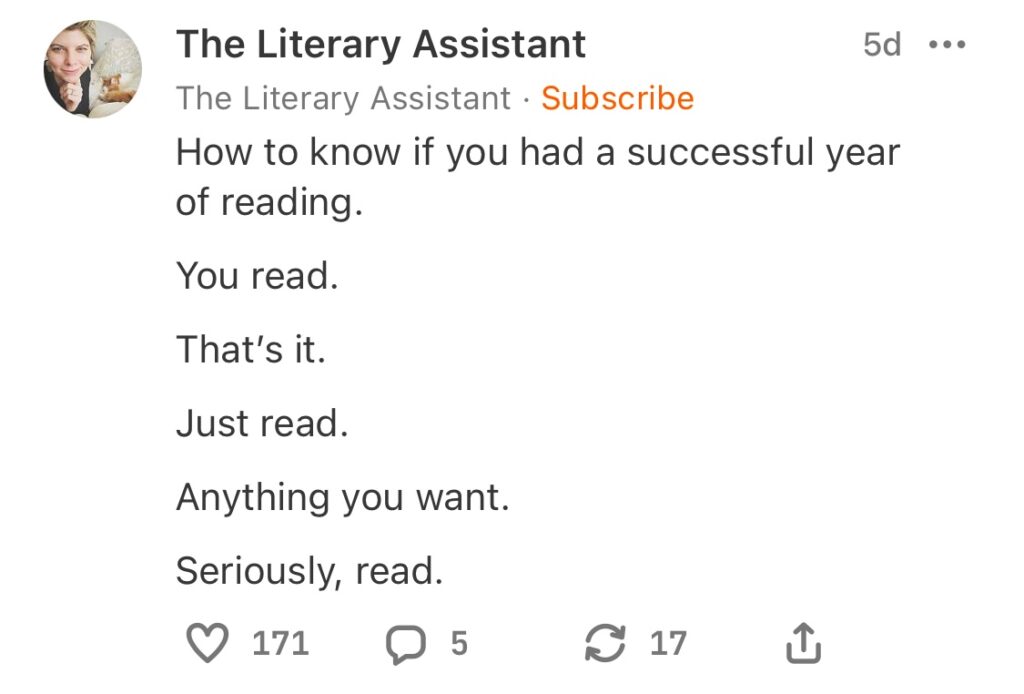Apparently a bunch of folks don’t believe it’s possible that anyone might read over 100 books a year.

I’ve read many such dismissive, eye-rolling comments lately. They annoy me.
Let’s math it out a bit, shall we? And also unpick some assumptions?
Let’s suppose you spend one hour a day reading. The average person spends, apparently, about three hours a day watching TV, so let’s use just one of those three hours for reading instead.
Note that I am in no way claiming TV (or any other activity) is in any way lesser. It’s just that as there are only 24 hours in a day, we have to carve out our leisure time from somewhere. Since the average is three hours of TV per day, for the sake of argument and practicality it makes sense to consider those three hours as average leisure time and divide them up however we want — books, TV, gaming, sports, whatever. Leisure is leisure and you do you.
If you’re a slow reader by nature or by choice — this too is not a judgment; there is no moral advantage to reading quickly — you might read about 15 pages an hour. This is a little slower than my reading speed in French, which is my second language, so it’s probably a reasonable estimate. (As a side note, I recommend graphic novels if you read slowly but like to turn the page with some regularity.)
Even at 15 pages per hour, reading for one hour a day adds up to 5,475 pages per year or about eighteen 300-page books. Or War and Peace three times over (four if you skip the philosophy essay chapters).
The internet tells me the average reading speed is about 30 pages per hour. At that rate an hour each day would add up to 10,950 pages or about 36 300-page books a year, and you’d still have two of your three leisure hours left to keep up on your games and sports and TV.
That’s one hour a day. If you take all three of your leisure hours and spend them reading at an average speed, you’re over 100 books a year. Q.E.D.
You might not choose to spend your leisure time this way but…. some of us do.
Now, perhaps add or substitute (because you do want to watch some TV or play some games or whatever) listening to an audiobook on your commute on the subway or while you’re walking the dog or working out or shopping or folding the laundry or falling asleep…. it adds up. And yes, audiobooks count as reading. Of course they count as reading. Don’t even start that absurd argument. This is leisure, not school.
Assigned reading and the general academic, relentlessly analytical approach to books at school broke reading for a lot of folks, I think. Many people are stuck thinking of reading as an unpleasant chore (“Will this be on the test?”) and they seem to think everyone else must be of the same opinion. Close reading can be fun and interesting but it’s not necessary to read everything that way. It’s a sad loss of an excellent leisure option. I know of no better way to get rid of those sticky assumptions than to start reading something you chose for yourself and will enjoy — preferably something school would never have exposed you to. Romantasy. Horror. Erotica. Manga. Hard sci-fi. Whatever, so long as your entire review is “That was fun. I liked it” and zero potential essay topics float through your thoughts. Not every book has to be deep or serious and even for the ones that are, we don’t always have to read deeply and/or seriously. A few ideas to break out of that mental rut:
- For pure silliness and sentences that veer off in sudden and unexpected directions: The Hitchhiker’s Guide to the Galaxy, by Douglas Adams. “The ships hung in the sky in much the same way that bricks don’t.”
- If you like the reflective kind of sci-fi: To Be Taught, If Fortunate, by Becky Chambers. It’s short but thoughtful.
- If you don’t mind a bit of math in your sci-fi, and also cussing: The Martian, by Andy Weir. With an opening line like “I’m pretty much fucked. That’s my considered opinion. Fucked.” how can you not read on? The book-suggestion Reddits recommend this one all the time.
- If you like nonfiction: anything by Mary Roach, but maybe start with Packing for Mars.
- If you like animal narrators (the cat in this one is perfect): Hollow Kingdom, by Kira Jane Buxton.
- If you need a fluffy romance: The Reluctant Widow, by Georgette Heyer. Regency romances are gentle — they never do anything too explicit or unexpected.
- If you’re looking for a dystopia that will linger in your mind: Never Let Me Go, Kazuo Ishiguro.
Of course, if you read more quickly than the average, you hit 100 books in much less time.
I read somewhere between 50 and 80 pages an hour and a total of about 30,000 pages a year. It’s not a goal, although StoryGraph presents it that way. It just happens.

I track the number of pages since it’s more relevant to me than the number of books. As you can see, this year I read 83 books — but two of them were War and Peace (in English and in French) which I did as a slow read with the excellent Footnotes and Tangents group led by Simon Haisell, and that’s 3000 pages already. Some years I’ve read 120 or 130 shorter books. The total number of pages tends to be about the same each year — about 30,000 — and the number of books averages a bit over 100.
That works out to between one and two hours of reading per day on average, although in practice I read a lot when I’m on vacation so it’s pretty uneven. Guess which months had vacations in them?

I don’t know what I was doing in July. I had some sewing projects, maybe?
Again, there’s no moral value to this and it’s not a race or any other kind of competition. It’s just how I choose to spend my time.

The average reading speed of 30 pages per hour is, interestingly, about the speed of audiobook narration. This suggests to me that a lot of folks are decoding or subvocalizing the individual words in their head as they read. I do this when I’m reading French. This is fine and normal! It works! But if you’re working out how it all sounds, there’s going to be a natural limit to how fast you read and that limit is going to approximate the speed of normal speech.
If you don’t subvocalize, though, it can be much faster. When I read in English, the words on the page don’t have sounds — the meaning just leaps into my head directly. I know I’m explaining it badly. I consulted the internet to see if someone else could explain it better… nope. People say things like “the concepts just appear in my head” and “I’m just thinking the words” and “it’s like a movie in my head” and “the words all get absorbed at the same time”. I nod my agreement with all of those. Take what meaning you can from that.
Another point people like to make is “but you can’t retain allll the information if you read that quickly,” and there are three answers to this:
- If that’s true: so what? Nobody expects anyone to retain every detail of every TV show or movie they watch or game they play, so why pile this extra expectation on books?
- That’s not their purpose. Books can be enjoyed as an experience, not as a learning activity. For those in the back: it’s supposed to be a pleasant leisure activity, not school or a chore.
- Don’t conflate speed-reading (the technique of scanning a text at high speed to extract the main points) and reading quickly. I see a lot of confusion about this. They’re very different things.
I’m definitely at the far end of the continuum for both reading speed and willingness to spend time sitting in a chair with a book. But…. I am still, very definitely, on that continuum. I’m not sure what the point would be of faking it or lying about it, so kindly take the dismissive disbelief elsewhere. You’re disturbing my reading.

